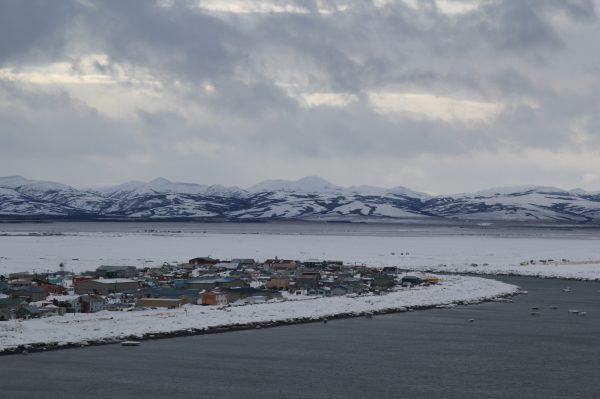
Unalakleet’s supply of water was running on empty following a nasty freeze-up at the end of December, prompting the community to pull together to conserve water.
“We did have some effects from the Dec. 26 storm that interrupted our water supply out at our source, Powers Creek,” said City Manager Moe Zamarron.
Freezing rain led to a frozen pool of standing water, which shifted the community’s pump house before the new year, reducing the flow of water into the water tank, Zamarron said. Levels were down to two feet early last week.
Zamarron said the tank didn’t reach empty this time, but it was down to about 7% of its total capacity. Unalaska School called off in-person classes on Friday due to the water issue.
“It took a lot of effort from the local community to conserve,” Zamarron said. “It was a community effort for everybody to pull together and see to it that we could turn this corner and begin the increased flow again and start building our reserves back up.”
The community had started to put more water back into the storage tank by late last week, Zamarron said. Unalakleet School resumed in-person learning on Monday.
But the repairs and resolution to the water issues are ongoing.
The Department of Housing and Urban Development recently awarded the Native Village of Unalakleet more than $650,000 to develop a water haul system. The funds came from a 2021 round of Indian Community Block Grants through the American Rescue Plan.
Unalakleet has struggled with its water system in the past, with almost annually recurring shortages, contamination issues or freezing pipes at the water tank.
According to HUD, the new system will provide the community more access to treated, potable water without having to rely solely on the water tank and Powers Creek.
In the meantime, Zamarron said the residents of Unalakleet came together to conserve water, share their subsistence foods and support each other to avoid a larger disaster.
[Sign up for Alaska Public Media’s daily newsletter to get our top stories delivered to your inbox.]
Davis Hovey is a news reporter at KNOM - Nome.
Hovey was born and raised in Virginia. He spent most of his childhood in Greene County 20 minutes outside of Charlottesville where University of Virginia is located.
Hovis was drawn in by the opportunity to work for a radio station in a remote, unique place like Nome Alaska. Hovis went to Syracuse University, where he graduated with a Bachelor’s of Science in Broadcast Digital Journalism.




